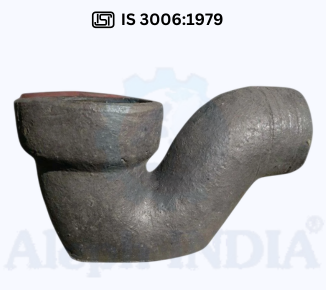BIS CERTIFICATION FOR CHEMICALLY RESISTANT GLAZED STONEWARE PIPES AND FITTINGS IS 3006:1979
Published Date: November 20, 2024 4 min Read
Introduction
ISI/BIS certification is mandatory for Chemically Resistant Glazed Stoneware Pipes and Fittings, as specified under IS 3006:1979. This standard ensures that these critical products meet stringent quality and performance criteria, particularly for applications involving chemical resistance and durability. These pipes and fittings are vital components in industries handling corrosive chemicals, offering robust solutions for fluid transportation while maintaining structural integrity and longevity.
By adhering to IS 3006:1979, manufacturers guarantee that their products conform to high standards of material quality, design, finish, marking, and packing, ensuring reliability and safety in demanding environments.
IS 3006:1979 – Chemically Resistant Glazed Stoneware Pipes and Fittings
IS 3006:1979 lays down comprehensive requirements for chemically resistant glazed stoneware pipes and fittings. This includes specifications for material composition, dimensional accuracy, chemical resistance, and mechanical strength. The standard ensures these products are capable of withstanding exposure to aggressive chemicals and high temperatures while maintaining leak-proof performance.
The classification involves rigorous testing to validate properties such as chemical resistance, glaze quality, dimensional tolerances, and mechanical strength. These tests ensure complete quality assurance, from raw material selection to the final product, guaranteeing safety, durability, and compliance with industrial standards.
BIS Certificate for Chemically Resistant Glazed Stoneware Pipes and Fittings IS 3006 from BIS
The mandatory BIS certification under IS 3006:1979 ensures that Chemically Resistant Glazed Stoneware Pipes and Fittings meet stringent industrial requirements. Certified products provide reliable and durable solutions for industries such as chemical processing, wastewater management, and pharmaceuticals, where resistance to chemical attacks and operational safety are critical.
BIS-certified products also reflect a manufacturer's commitment to maintaining high standards of quality, safety, and environmental compliance, ensuring they meet the expectations of both regulatory authorities and end-users.
Key highlights
| Product Name | Chemically Resistant Glazed Stoneware Pipes and Fittings |
| Applicable Indian Standard | IS 3006:1979 |
| Applicable Certification Scheme | Product Certification Scheme (ISI Mark Scheme) Scheme 1 - Schedule 2 |
| Applicable Mark: | BIS Standard Mark (ISI Logo) |
| Compliance Requirement | Mandatory |
| Quality Control Order | Click here |
| Ministry | Ministry of Commerce and Industry |
| Scope as per Standard | -- |

Note
For Detailed Information about the Procedure for BIS ISI Certification, Visit :
Timeline for BIS Certification
The approximate timeline to obtain BIS certification for Chemically Resistant Glazed Stoneware Pipes and Fittings under IS 3006:1979 is as follows:
- For Indian Manufacturers (Standard Timeframe – 30 days)
- For Foreign Manufacturers (Standard Timeframe – 180 days)
Conclusion
BIS certification under IS 3006:1979 serves as a mark of quality and compliance, providing industries with confidence in the durability and reliability of Chemically Resistant Glazed Stoneware Pipes and Fittings. For manufacturers, this certification is essential to ensure market acceptance and regulatory compliance, showcasing their commitment to delivering high-performance, durable, and safe products.
By adhering to IS 3006:1979, manufacturers can provide solutions that excel in quality and durability, significantly enhancing operational efficiency and safety across chemical and industrial applications.
For more updates and detailed procedures, stay connected with Aleph INDIA and ensure your products are always compliant and top-quality.
Frequently Asked Questions
International Audits & Participation
Testimonials
BIS REGISTRATION FOR ELECTRONIC & IT PRODUCT
In the era of globalization, world trade is growing rapidly and henceforth, Manufacturing and Import/Export businesses are also growing drastically...View More
BIS CERTIFICATE FOR FOREIGN MANUFACTURER
The Economy of India-the fastest developing economy on the globe with the capabilities that help it matches up with the biggest international...View More
PRODUCT CERTIFICATION SCHEME (ISI MARK) FOR DOMESTIC MANUFACTURERS
Anything a person buys from food to cars, clothes to electronics, branded to unnamed products there is always a question that wanders in one’s...View More
WIRELESS PLANNING AND COORDINATION (WPC)
WPC: Wireless means communication done from one point to another point without the wires and cables. Electromagnetic waves carry the ...View More
BUREAU OF ENERGY EFFICIENCY (BEE) CERTIFICATE
BEE CERTIFICATE: Energy is the future, and its conservation is the way of the bright future. Everyone claims the environment is important...View More
E-WASTE MANAGEMENT
E-waste is one of the world's fastest-growing trash streams. We currently manufacture almost 50 million tones of it each year...View More
View All Services
Request a call back.
Would you like to speak to one of our Senior Technical advisers over the phone? Just submit your details and we’ll be in touch shortly. You can also email us if you would prefer.






























